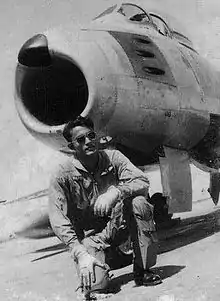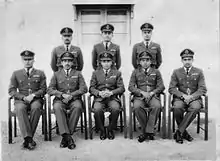Waleed Ehsanul Karim
Waleed Ehsanul Karim (Bengali: ওয়ালীদ এহসানুল করিম, Urdu: ولید احسان الکریم; 1 July 1944 – 19 April 1965) was a fighter pilot in the Pakistan Air Force and one of the youngest F-86 Sabre pilots in the world.[1]
Waleed Ehsanul Karim | |
|---|---|
 Flg. Officer Waleed kneeling in front of his North American F-86 Sabre jet fighter, c. 1964 | |
| Born | 1 July 1944 Harbang, Cox's Bazar, British India |
| Died | 19 April 1965 (aged 20) Arabian Sea |
| Allegiance | |
| Service/ | |
| Years of service | 1963–1965 |
| Rank | |
| Service number | PAK-4362 |
| Unit | 17th Squadron (The Tigers) |
| Battles/wars | Indo-Pakistani War of 1965 † |
| Signature | |
Background
Karim was born on 1 July 1944 to Fazlul Karim and Nazmunnisa Chowdhurani in Harbang, Chakaria, Cox's Bazar, British India (later East Pakistan, now Bangladesh). He completed his Senior Cambridge (GCE) from PAF Public School Sargodha in April 1961 (5th Entry, Sabre House) and joined the Pakistan Air Force in August 1961.
Cadet in the PAF
He gained commission with the Pakistan Air Force (PAF) on 22 June 1963 in the 36th GD(P) Course with serial number PAK-4362, and being the Wing Under Officer, was a candidate for the Sword of Honour, but did not end up receiving it. In a debate at the PAF Academy in Risalpur, Karim passionately advocated for the Language Movement of 1952, which compelled the Government of Pakistan to establish Bengali as an official language on par with Urdu and English, which were the official and mainstream languages in West Pakistan. He was later nominated and became known as the captain of the basketball team at the academy. Flight Lt. Matiur Rahman (later recipient of the Bir Sreshtho in the 1971 Bangladesh Liberation War) and Air Vice-Marshal Momtaz Uddin Ahmed were his classmates in both Sargodha and Risalpur.


Fighter pilot in the PAF
Following his commission, Karim was posted with the No. 2 Squadron at PAF Base Masroor in Karachi, Sindh, West Pakistan. After successfully completing Jet Conversion Training on T-33 jet trainers, he was designated for a Fighter Conversion Training Course with the North American F-86 Sabre (a relatively new aircraft being delivered by the United States to Pakistan since the late 1950s), following which he was posted with the No. 19 Squadron in Peshawar due to his strong performance.
Karim was famous amongst personnel in the PAF for the daring stunts he performed with his F-86 Sabre, and also took part in the Republic Day flybys in Rawalpindi on 23 March 1965 as a wingman alongside Air Marshal Asghar Khan (then Chief of Air Staff of the Pakistan Air Force) and Air Commodore Zafar Chaudhry in Lockheed F-104 Starfighters.
Indo-Pakistani War of 1965
Karim was killed on 19 April 1965, during skirmishes with Indian forces in the Rann of Kutch that directly preceded the Indo-Pakistani War of 1965. His Sabrejet, which was hit by Indian anti-aircraft guns early in the morning, had serious engine trouble and rapidly plunged into the Arabian Sea about 10–15 miles off of the southern coast of Karachi at night as he was returning from a reconnaissance mission over Gujarat, India. He had engaged the Indian Army in strafing runs throughout the Rann of Kutch and dropped smoke bombs during the daytime to screen attacks by Pakistani infantry. Neither his body nor his aircraft were recovered, although part of the rudder from the F-86 was found about two months after the incident and subsequently retrieved. He was a fighter pilot with the 17th Squadron (The Tigers) of the Pakistan Air Force when he died, and Air Marshal Azim Daudpota was his squadron leader at the time.
References
- Bowman, Martin (30 January 2016). Cold War Jet Combat: Air-to-Air Jet Fighter Operations 1950-1972. Casemate Publishers. ISBN 9781473874626.